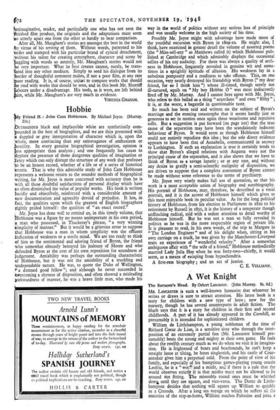Hobbie
Friend H.: John Cam Hobhouse. By Michael Joyce. (Murray.
yPay
1 21s.) PUTRAGEOUS black and implausible white are synthetically com- pounded in the best of biographies, and we are thus presented with ?a dappled or grey interpretation of character which is, upon the whole, more convincing than any extravagance of enthusiasm or teostility. In every genuine biographical investigation, opinion is ess appropriate than analysis - and one frequently has cause to eplore the presence of those dangerous qualities of imagination or fancy which can only disrupt the structure of any work that professes )to be an honest record, whether of a life or of a series of historical 'events. That is why this admirable study of John Cam Hobhouse represents a welcome return to the sounder methods of biographical writing, for Mr. Joyce is more concerned with accuracy than he is with all those doubtful satisfactions of personal display which have so often diminished the value of popular works. His book is written lucidly and objectively, reinforced with a considerable amount of new documentation and agreeably devoid of prejudice. It has, in fact, the qualities upon which the greatest of English biographers rightly prided himself : the qualities of " an exact record."
Mr. Joyce has done well to remind us, in this timely volume, that Bobhouse was a figure by no means unimportant in his own period, S man who possessed, in Thackeray's phrase, " a very winning Simplicity of manner." But it would be a grievous error to suppose that Hobhouse was a man in whom simplicity was the effluent indication of weakness or a sterile mind. We are too ready to think of him as the sentimental and adoring friend of Byron, the friend who somewhat obtusely betrayed his jealousy of Moore and who defended Byron at the cost of his own reputation for soundness of judgement. Amiability was perhaps the outstanding characteristic of Hobhouse, but it was not the amiability of a truckling and undependable nature. He was, to quote the Duke of Wellington, 4` a damned good fellow "; and although he never succeeded in 'overcoming a shyness of disposition, and often showed a misleading awkwardness of manner, he was a brave little man, who made his way in the world of politics without any serious loss of principle and was usually welcome in the high society of his time.
Possibly Mr. Joyce might with advantage have made more of the youthful excursion with Byron in 1809-to. He might also, I think, have examined in greater detail the volume of assorted poems (the " Miss-sell-any " as Matthews called it) which Hobhouse pub- lished at Cambridge and which admirably displays the occasional sallies of his coy audacity. For there was always a quality of arch- ness in Hobhouse, frequently revealed in genuine wit and some- times in a sprightly aptitude of allusion. His weakness lay in a nebulous pomposity and a readiness to take offence. This, on one occasion, very nearly destroyed his friendship with Byron (" my dear friend, for so I think him ") whose ill-timed, though surely not ill-natured, squib on " My boy Hobbie 0 " was most indiscreetly fired off by Mr. Murray. And I cannot here agree with Mr. Joyce, who refers to this ballad as a thing " scurrilous " and even " filthy" ; it is, at the worst, a bagatelle in questionable taste.
So much has been said and written on the subject of Byron's marriage and the ensuing catastrophe that it seems hardly just or generous to set in motion once again these wearisome and repulsive coils. But a suggestion is put forward (on page tot) that the true cause of the separation may have been the scandalously indecent behaviour of Byron. It would seem as though Hobhouse himself could not entirely repudiate this idea ; but the sole direct evidence appears to have been that of Annabella, communicated in secrecy to Lushington. If such an explanation is true it certainly tends to show that Byron's alleged relations with Augusta were not the principal cause of the separation, and it also shows that we have to think of Byron as a savage lunatic ; or at any rate, and without any desire to gratify a semi-scientific malignity of disposition, we are driven to suppose that a complete assessment of Byron cannot be made without some reference to the terms of psychiatry.
Mr. Joyce very wisely makes full use of quotation, so that his work is a most acceptable union of biography and autobiography. His portrait of Hobhouse, may, therefore, be described as a vocal portrait, and it is the accent of Hobhouse himself which gives to this most enjoyable book its peculiar value. As for the long political history of Hobhouse, from his election to Parliament in 182o to his retirement by Russell in 1851, it is the history of a temperate though unflinching radical, told with a sedate attention to detail worthy of Hobhouse himself. But he was not a man so fully revealed in politics as he was in the more respectable region of private life. It is pleasant to read, in his own words, of the trip to Margate in " The London Engineer" and of his delight when, sitting in his own carriage on a truck, he was given by the Manchester-Liverpool train an experience of " wonderful velocity." After a somewhat ambiguous affair with " the wife of a friend," Hobhouse methodically married Lady Julia Hay when he was forty-two—chiefly, it would seem, as a means of escaping from hypochondria.
A first-rate biography ; and an act of justice.
C. E. VULLIAMY.


































 Previous page
Previous page